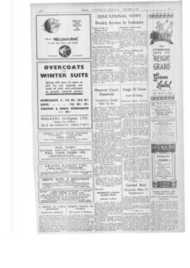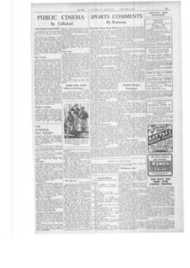Page 11, 3rd January 1936
Page 11

Report an error
Noticed an error on this page?If you've noticed an error in this article please click here to report it.
Tags
Share
Related articles
A Master Technician In His Own Class
Songs Of Christmas Praise
MUSIC
By Charles G.
Mortimer
Wilfrid Sanderson, who died in the early part of December, was a musician of parts. Although he chose to specialise, during a long and prosperous career, in songs and ballads, there was a reserve of force and skill about everything he wrote. He had the choice of all the best that contemporary lyric writers could offer him, and he never entertained any words that did not suit his style. His success was due to the fact that his simple, straightforward methods carried conviction, and moreover his songs were just as popular with the vocalist as with the audience.
There are still a certain number of people who affect to despise popular achievement of this kind, but they are totally wrong. It requires considerable talent and an outstanding knowledge of the particular needs of song-writing to achieve Sanderson's measure of success. We ought to be grateful always to anyone who keeps the art of music on sane and popular lines.
Highbrow and Lowbrow
One of our chief troubles during the last ten years has been that the arts have been appropriated at times by various little sects and cliques, and we have had to put up with a good deal of intellectual snobbery. Two idiotic words have been introduced into the language, " lowbrow" and " highbrow," as if humanity fell into two categories.
This is quite false where music is concerned, and the greatest artists have always realised it. I have talked myself to the most unlikely-looking people in tubes or trams, and heard sometimes that they possessed a complete set of Beethoven's symphonies and were going home to enjoy them after the day's work in garage, shop or factory.
Mechanical music, doubtless, has led to the embracing of this greater public in the realm of serious music; but the point is that these people are not strangers or hangers-on; they are able to receive with deep-felt appreciation what is really best in music. There is a warning here against extravagance and affectation on the part of composers, a warning against too much self-assertion and a false striving after originality.
Men have always lived in communities and music should reflect this community life, it may be of a favoured race or a great musical centre; but if music gets into the hands of an individualist, it cannot prosper in the end. No man lives to himself, least of all the possessor of genius.
The Tens1cm of Conducting
The news that Stokovsky has severely strained the muscles of his back in conducting a symphony of Sibelius may bring home to the public the nature of the physical tax upon any conductor. It is no light matter to stand with the right arm extended and waving a baton, but in addition to this the conductor is working at high nervous pressure, turning rapidly from left to right, especially when his orchestra consists of a hundred players like the Philadelphia, and is indeed experiencing all the tension of a man driving and controlling a high-powered car.
Of course there are some conductors, men of second-rate ability, who follow, rather than lead, their orchestras, yet even they expend a great deal of nervous energy! Then again, there is the human side of the art, the problem of controlling, and coaxing at times, so many divergent wills and personalities.
In addition, the conductor must know the score he is conducting inside out, and if anyone cares to look into some of our modern scores, he will see at a glance what that entails. All praise, then, to our great conductors, and a speedy recovery to Stokovsky.
Sir T. Beecham's " Messiah"
Sir Thomas Beecham's handling of the Messiah has come in for a certain amount of criticism of late, and perhaps in our hearts we all prefer the old-fashioned and more leisurely rendering of this work than an attempt to bustle it and galvanise its duller periods. But it is always rash to challenge the performances of this conductor, as he can probably produce admirable reasons for all he does.
Still, it is just possible that in this particular work the conductor has fallen a prey to a tendency of to-day, namely, a desire to bring a certain type of music up to an emotional level that it will not bear.
In our hurried and perfervid life I have heard a good many musicians confess that they cannot listen any longer to the quieter works of Haydn and Mozart, or even to a Beethoven symphony. There will be a reaction one day and the music of the future may be something very plain and simple, and the orchestra will be shorn of all exaggerated effects.
The London Symphony orchestra, at their next concert on Monday, January 27, in response to numerous requests, are giving Bach's Die Kunst der Fuge. The conductor on this occasion will be Hans Weisbach.
Mr. Shaw Answers An Invitation
Mr. Bernard Shaw sent a characteristic reply to an invitation to attend a public celebration meeting at Sussex Hall, London, in connection with the golden jubilee of the Indian National Congress. Mr. Shaw's secretary wrote : " Mr. Bernard Shaw asks me to say that the Indian question is far too big for messages, and it is not his business anyhow. His interference in such ,a congress would be an impertinence."
blog comments powered by Disqus

















